The State of Israel is a democratic republic in the Middle East.
Israel's Borders
In the West – the Mediterranean Sea and the Gaza Strip; in the North – Lebanon and Syria; in the East – Jordon and Palestinian Authority autonomous territories; in the South – Egypt and the Red Sea. Israel holds territories that it captured in 1967 from Syria (the Golan Heights), Jordan (the West Bank) and Egypt (Gaza). In certain sections of the West Bank, an autonomous Palestinian Authority was established.
Government and Administration
The state of Israel is republic, defined as a parliamentary democracy with proportional representation. The legislative authority is the Knesset and the executive authority is the government. Since the country's inception, no political party has achieved an absolute majority, and thus, all of Israel's governments have been coalition governments. Israel has a president who is chosen by the Knesset once every seven years. His role is symbolic, having only the power to appoint the specific member of Knesset who determines the make-up of the government and to grant pardons.
Israel is administratively divided into 6 districts and 14 provinces. Judea, Samaria and Gaza have a separate administration. Regional authorities – municipalities and local or regional councils – have legal jurisdiction in their area, as well as responsibility for legal services.
The country has a mandatory education law, which states that all Israeli children are entitled to eleven free years of education, from kindergarten to grade ten. For higher learning, Israel has universities, colleges and institutions of religious instruction (yeshivot, midrashot).
The state of Israel has general health care, which provides a medical services package for every citizen. Enforcement of this is split between the Ministry of Health and the health maintenance organizations. Citizens pay a health tax to national insurance.
| Official name | State of Israel |
| GPI | 22,145 square km |
| Population | 7,047,0001 |
| Population growth rate | 1.39 percent |
| Demographics - Ethnicity | Jewish 80.1 percent (32.1 percent born in Europe/North America, 20.8 percent born in Israel, 14.6 percent born in Africa, 12.6 percent born in Asia). Non-Jewish (primarily Arab) 19.9 percent |
| Demographics - Religion | Jewish 79 percent, Muslim 17.3 percent, Christian 2.1 percent, Druze 1.6 percent |
| Official languages | Hebrew, Arabic |
| Capital | Jerusalem |
| Government | Democratic republic |
| GDP | 523.852 billion NIS (as of 2004) |
| Estimated GDP growth rate | 3.9 percent (as of 2004) |
| Population under poverty line | 23.6 percent (as of 2004 |
| Inflation rate | 1.4 percent (as of 2004) |
| Unemployment rate | 10.7 percent (as of 2004 |
| Major industries | Software, telecommunications, weapons, phosphates, diamonds, agriculture |
| Imports | 34.41 billion dollars (as of 2004 |
| Exports | 36.84 billion dollars (as of 2004 |
State of Israel: History
The State of Israel was established in 1948, amidst clashes with British Mandatory forces, Arab residents, and the Arab states which declared war on the nascent state on the very day of its founding.
The struggle for Israeli independence
In the wake of the Holocaust, the Jewish community in the Land of Israel, as well as the worldwide Zionist Movement, became increasingly cognizant of the fact that an independent and sovereign Jewish state was necessary to provide haven for the decimated Jewish nation.
The struggle was conducted on two fronts: an armed and political battle against the British Mandatory forces and a worldwide diplomatic and explanatory campaign, especially in the United States. Concurrently, much effort was invested in the Ha’apalah, the so-called “illegal” Jewish immigration to the Land of Israel, which was, in effect, an attack against British Mandatory policies.
Although Britain emerged victorious from World War II, the country was heavily hit in economic and social terms. Then, during the post-war years, the British Empire began to unravel. Once the British Raj ended in India, the Land of Israel lost much of its strategic importance, as the British no longer required a foothold adjacent to the Suez Canal.
In 1947, Britain requested that the UN retract the Mandate granted to Britain by the League of Nations. The UN appointed a special committee (UNESCOP), which recommended that the land west of the Jordan River be partitioned into two states: one Jewish and one Arab. On November 29, 1947, the General Assembly voted in favor of partition, which became known as Resolution 181. The Jewish community rejoiced, but the Arabs rejected the decision and began fighting the very next day.
According to Resolution 181, the British Mandate was set to expire on May 15, 1948. Since the 15th came out on Shabbat that year, the National Council convened on Friday, May 14, and declared the establishment of the State of Israel. The Declaration of Independence surveyed the historical connection between Am Yisrael (the nation of Israel) and its land and laid out the new state’s founding principles, but specific borders were not mentioned.
In addition, the Declaration of Independence introduced the name of the Jewish State: “We hereby declare that as from the termination of the Mandate… the present National Council shall act as the provisional administration and… shall constitute the Provisional Government of the Jewish State, to be called Israel.” The name was derived from the Land of Israel, the historic name of the Jewish national homeland.
Both the US and the USSR immediately recognized Israel, and additional countries followed suit. However, the Arab League was determined to destroy the new state, and on May 15, the Egyptian, Jordanian (then called Trans-Jordanian), Syrian, Iraqi and Lebanese armies, together with irregular forces from other Arab nations, invaded Israel.
The War of Independence thus evolved from a conflict between two resident populations to a full-fledged war between organized armies. Following a year and a half of fighting, an Armistice Agreement was reached between Israel and most of the Arab countries. Iraq, which continued to maintain a state of war with Israel, remained the lone exception.
From this point on, Israeli history was punctuated by wars with its Arab neighbors. Each war left a unique and lasting impact on Israel’s foreign affairs, economy, and social fabric.
From the War of Independence until the Sinai War (1948-1956)
Even as the war raged, the new state’s institutions were organized. For example, the Assembly of Representatives became the Knesset, and the National Council became the government, under the leadership of David Ben-Gurion. The government assumed the Mandatory Government’s authorities, but since the British left without arranging for an orderly transfer of power, the process was complex and difficult.
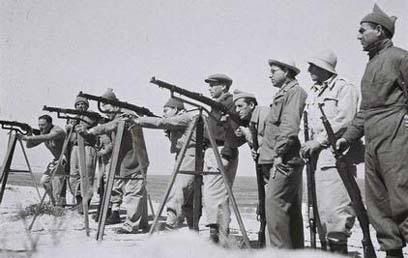
War of Independence: Hagana troops practicing (Photo: La'am)
Meanwhile, large immigration waves reached Israeli shores. Between 1948 and 1951, approximately 700,000 Jews arrived; entire communities came from Libya, Yemen, Bulgaria, and Iraq. In 1950, the Law of Return, which granted full Israeli citizenship to every Jewish immigrant, was enacted. More immigrants arrived during 1955-1957, including around 160,000 North African and Eastern European Jews.
As a result of the economic costs of the war and absorbing the immigrants, an austerity program (1949-1952), which involved much rationing, was instituted. In 1952, the government signed a controversial reparations agreement with Germany. Despite the resulting political and public storm, the agreement increased the market’s momentum.
Arab infiltrations began almost immediately following the Armistice. Palestinian refugees would clandestinely cross Israel’s borders, in order to commit crimes and, later, also sabotage. Israel responded with reprisal attacks. Although the process escalated gradually, some historians cite the Black Arrow attack of February 28, 1955, as a key turning point. On that night, the IDF attacked an Egyptian army installation in the Gaza Strip; previously, most of the operations had been directed at Palestinian targets. The Egyptians began organizing bands of Palestinian infiltrators called “fedayeen”, which, in essence, comprised the first Palestinian terror organization.
In September 1955, Egypt signed an arms deal with Czechoslovakia. (In fact, Czechoslovakia, as a Soviet satellite, would be passing on weapons supplied by the USSR.) The huge amount of weaponry involved was unprecedented in the Middle East. Syria signed a similar deal, albeit on a smaller scale. Israelis sensed that “Round Two”, between Israel and its Arab neighbors, was fast approaching.
Israel began strengthening its military ties with France, since Ben-Gurion had insisted that Israel not go to war without the support of at least one major power. France was amenable to Israeli overtures, because the French blamed Egyptian leader Gamal Abed an-Nasser for much of their Algerian troubles. After Nasser nationalized the Suez Canal on July 26, 1956, Britain joined the conflict. On October 22, senior representatives of France, Britain and Israel met in Sèvres, outside of Paris, and agreed to go to war against Egypt. The Sinai War began on October 29.
From the Sinai War until the Six Day War (1957-1967)
The Sinai War ended on November 6, 1956, and, to Israel’s chagrin, the world’s superpowers soon forced Israel to relinquish all its territorial achievements. The IDF pulled back from the Sinai and the Gaza Strip in March 1957, and a UN Emergency Force was mobilized along the border.
A period of relative quiet ensued, and Israel strengthened its economy and developed the national infrastructure during the interlude. Also, the Eichmann Trial, which occurred during this time, increased Israeli sensitivity to the Holocaust. Meanwhile, by 1966, another 300,000 immigrants had arrived. However, in the wake of a severe recession in 1965, immigration rates dropped. Several scandals rocked the political establishment; in particular, the infamous “Lavon Affair” sent shockwaves up to the highest echelons. David Ben-Gurion resigned and left the Mapai party; Levi Eshkol became the next prime minister. Finally, Israel sent out diplomatic feelers to a number of newly independent Asian and African nations, as well as to several South American countries.
In 1964, neighboring Arabs began infiltrating the country again, after ceasing the phenomenon in the wake of the Sinai War. In addition, the Palestinians established the al-Fatah organization, and terrorists entered Israeli territory. The Palestine Liberation Organization (PLO), with al-Fatah at its core, was founded at the end of 1964. Nevertheless, the number of attacks was lower that during 1954-1956, and there were fewer reprisal raids.
A more serious problem was meanwhile developing on the northern border. Following the completion of the National Water Carrier, both Syria and Lebanon repeatedly attempted to divert the sources of the Jordan River; Israel responded with fire. The situation quickly deteriorated, and the IDF and Syrian army were involved in heavy fighting, referred to as “the War for Water”.
At the same time, Egypt expressed concern over the nuclear reactor that Israel was allegedly building near Dimona. After an air battle over the Golan Heights on April 7, 1967, during which six Syrian aircraft were downed, Egypt announced that it was allying itself with Syria. Thus, on May 15, Egyptian forces entered the Sinai, in violation of the agreement signed in 1957, in the wake of the Sinai War. In addition, Egypt closed the Straits of Tiran to Israeli ships and ordered UN forces to withdraw from their positions along the border.
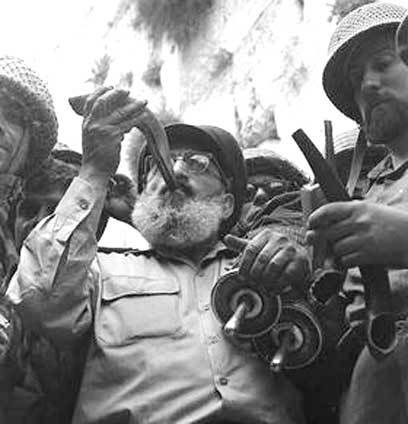
IDF Chief Rabbi, Goren, at the Kotel (Photo: La'am)
Israel realized that a war was imminent, and the mood throughout the country was somber and grave. The IDF called up the reserves, and Prime Minister Eshkol, aware that he had not managed to inspire confidence, transferred the defense portfolio to Moshe Dayan. A historical first was achieved when the Herut party joined the newly formed national unity government.
On June 6, the Six Day War broke out, as the IDF went to war against Egypt, Syria, and Jordan.
From the Six Day War until the Yom Kippur War (1967-1973)
In the wake of Israel’s stunning victory in the Six Day War, unbridled euphoria swept through the country. The IDF had acquired the Golan Heights, Judea, Samaria, the Gaza Strip, and the entire Sinai Peninsula up to the Suez Canal (which had been closed to shipping). But most significantly, Jerusalem had been reunified, and for the first time since 1948, Jews were able to pray at the Western Wall. Israel immediately annexed the eastern portion of Jerusalem but declared that other territories were being held in the hope of a peace treaty. “We are waiting for a telephone call from the Arabs,” Dayan asserted.
Yet, despite Dayan’s declaration, Jewish communities were built in the territories. The government officially authorized settlement of the Golan Heights, the Jordan Valley, southern Sinai, and, eventually, also the area around Rafah. However, official policy was more ambiguous in Judea and Samaria, where the government preferred that Jews not move into areas heavily populated by Arabs. Nevertheless, many such settlements were established, with considerable support from numerous government ministers as well as Knesset members. In addition, a construction wave was initiated in eastern Jerusalem, which the Arabs and much of the world insisted on calling “occupied territory”.
In November 1967, the UN Security Council accepted Resolution 242, which included the concept of “land for peace”, but the vote had no practical significance. US Secretary of State William Rogers introduced another peace initiative, which also never took effect but led to the unraveling of the Israeli national unity government. Previously, in February 1969, Prime Minister Eshkol passed away, and Golda Meir took his place.
The PLO built bases in the eastern Jordan Valley and dispatched terrorists into Israeli territory. Several pursuits were launched in the valley (which became known as “pursuit land”) during 1968-1970, until Jordan expelled the terrorists following the “Black September” riots of 1970. Most Palestinian organizations relocated to southern Lebanon and Syria.
Arab terrorism also concentrated on Israeli civilian aviation and targets throughout the world, and high profile attacks were committed in Israel itself, sometimes with the help and support of foreign terror organizations. Several glaring examples included the hijacking of an El Al airplane to Algeria on July 23, 1968, which was the first of its kind; the massacre at Lod Airport on May 30, 1972, which was committed by Japanese terrorists masquerading as passengers; and the abduction and subsequent murder of 11 Israeli Olympians in Munich on September 5, 1972.
In March 1969, Egyptian President Nasser instructed his army on the Suez Canal front to open fire on all exposed targets. Thus began the War of Attrition, which mainly comprised heavy exchanges of fire across the canal, as well as several raids behind enemy lines (on both sides) and Israeli air attacks deep into Egyptian territory. The US was forced to intervene and impose the above mentioned Rogers plan. In August 1970, the war ended, and Nasser died a few weeks later.
In spite of the fighting along the borders, many Israelis felt safe and secure. The country had complete confidence in the IDF’s ability to protect the nation. In fact, for the first time since the establishment of the state, the public believed that Israel’s existence was guaranteed. The severe recession of the prewar period made way for an era of economic growth, and many citizens trusted that the situation would only continue.
From the Yom Kippur War until the Political Upset (1973-1977)
Disillusionment was exceptionally painful. Egypt and Syria clandestinely planned a full-fledged surprise attack on Israel, hoping to retrieve the territories they had lost during the Six Day War. The working assumption was that even if the Egyptian and Syrian armies were unable to regain the land themselves, Israel would be forced to give up the territories, due to the international pressure which would surely result from the war. On Yom Kippur 5733, October 6, 1973, the Yom Kippur War broke out.
The IDF was not prepared. Even though the army soon recovered, – the territory lost on the Golan Heights was regained within three days, and ten days after the fighting began, IDF forces penetrated Egyptian territory, although Egyptian forces were not yet pushed out of the Sinai – nevertheless, the sense of defeat, which had characterized the first few days of fighting, did not abate even once the war had ended.
In the aftermath of the war, an investigative committee, headed by Chief Justice Shimon Agranat, was appointed. The so-called Agranat Commission made several recommendations concerning high-ranking military leaders, including Chief of Staff David Elazar, but refrained from discussing the political echelon.
A number of Arab countries sent troops to fight alongside Egypt and Syria. (Jordan notably stayed away.) In addition, the oil-rich Arab nations, collectively known as OAPEC, announced that they were decreasing production and placing an oil embargo on the US and Holland, due to their support of Israel. Shockwaves raced around the world; the so-called “first energy crisis” had begun. The Organization of Petroleum Exporting Countries (OPEC), which included all the OAPEC members, took advantage of the Arab embargo. Crude oil prices quadrupled within just a few months.
The energy crisis threatened most of the world’s non-OPEC members, many of whom blamed Israel. As a result of the war, which was perceived in some circles as an Arab victory, and the deteriorating global economy, Israel lost much of its international standing. Furthermore, the rising oil prices directly affected Israel’s economy, which was largely dependent on oil imports.
Nonetheless, Israel managed to weather the war’s economic fallout, mainly due to unprecedented American aid. Since 1974, American foreign aid to Israel, comprised of both military and economic aid, has equaled several billion dollars a year. Still, the economic upswing of the prewar period was considerably overturned.
The settlement enterprise continued, occasionally accompanied by clashes with the government in places such as Kedumim. Terror persisted as well, including the infamous hijacking of an Air France plane to Entebbe, Uganda. The subsequent IDF rescue mission on July 4, 1976, made headlines throughout the world. On June 7, 1981, Israel conducted another daring raid and destroyed Iraq’s nuclear reactor a short while before it was scheduled to go live.
The Alignment Party won a proportional majority in Israeli elections held shortly after the war. However, the public no longer trusted the party’s veteran leadership, and Prime Minister Meir and Defense Minister Dayan were forced to resign. Yitzchak Rabin became the next prime minister.
From the Political Upset until the Lebanon War (1977-1982)
The elections of 1977 have been described as a dramatic upset; for the first time in Israeli history, a group of center/right parties, collectively known as the Likud, formed a government. Menachem Begin, who had led the opposition since the state’s founding, became the prime minister. Although the upset can be attributed to the aftershocks of the Yom Kippur War, other factors also contributed to the political turnaround. Wide swaths of the public felt disenfranchised, and great rifts were becoming apparent throughout Israeli society.
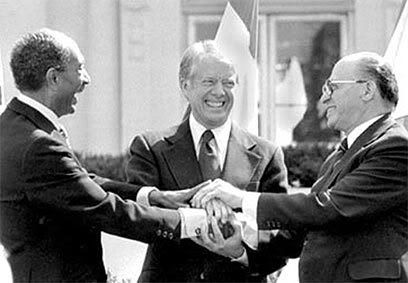
Israeli PM Begin with Egyptian President, Saadat
and US President Carter in Camp David (Photo: AP)
A radical turnabout in Israeli-Arab relations occurred towards the end of 1977. Following clandestine talks between Israeli and Egyptian officials, Egyptian President Anwar Sadat publicly announced that he intended to visit Jerusalem, address the Knesset, and discuss peace. Sadat arrived in Israel on November 19, and Egypt and Israel launched peace talks, under American auspices. Two years later, in 1979, the two countries signed the Camp David Accords. Virulent public storms arose in the wake of the subsequent Israeli withdrawal from the Sinai and the evacuation of Yamit in 1982. A series of governmental countermeasures included the enactment of the Jerusalem Law of 1980 and the declaration of Israeli sovereignty over the Golan Heights in 1981.
One major social development at that time was the growing strength of the haredi sector. Prior to 1977, this closed community had been relatively insignificant; although the haredim always enjoyed Knesset representation, haredi involvement in the nation’s political life was minimal. However, in 1977, Begin invited Agudat Yisrael, a haredi party, to join his coalition, even though the Dash party, comprised of former Alignment members, was larger. As a result, the haredi public’s ranks swelled, and its members became more politically and economically active.
The Lebanese civil war, which had begun in 1975, grew steadily worse, and the northern terrorists became bolder. Israel’s anti-terrorist activities included establishing the South Lebanese Army (SLA) under Saad Hadad’s command and opening the so-called “Good Fence”. Nevertheless, the terror continued, and on March 14, 1978, the IDF entered Lebanese territory as part of Operation Litani. Israel retreated approximately three months later, after a UN peacekeeping force was stationed as a buffer between the Israeli border and PLO positions throughout southern Lebanon. (In effect, the buffer became an SLA-controlled security zone.)
The arrangement soon proved ineffective, and on June 6, 1982, following an assassination attempt on the Israeli ambassador to Britain, the Lebanon War began.
From the Lebanon War until the Oslo Accords (1982-1995)
As opposed to the previous Arab-Israeli wars, the Lebanon War did not end with either a ceasefire or an armistice agreement. In fact, Israel’s objectives were not fully achieved. Although the IDF controlled about half of Lebanon’s territory, Israel had not managed to either destroy the PLO or impose a “new order” on Lebanon. Prior to the war, Israel had envisioned a sovereign Christian-controlled Lebanon which would sign a peace treaty with Israel and conduct full diplomatic relations. However, Lebanese Phalangist leader Bashir Gamayel’s assassination on September 14 shattered all Israeli illusions.
In the wake of the assassination, Christian forces massacred Palestinian residents of the Sabra and Shatila refugee camps, thus igniting a storm of protests in Israel and throughout the world. The Israeli government and the IDF leadership were accused of ignoring the massacre, and the Kahan Commission, appointed to investigate the killings, recommended that Defense Minister Ariel Sharon be dismissed.
IDF forces in Lebanon came under continuous fire and were the targets of terror attacks committed by the assorted paramilitary organizations then operating in Lebanon – including those that had initially welcomed the IDF with flowers. In 1985, the IDF began slowly retreating southward, and a “security zone”, under joint IDF-SLA control, was established in southern Lebanon. Relative quiet prevailed on Israel’s northern border, but flare-ups persisted within the security zone.
Socially and economically, this was a tempestuous period in Israeli history. The Likud government, which adhered to a liberal worldview, oversaw certain economic steps which quickly led to a galloping inflation, which had reached 400% by 1983. During that same year, bank shares collapsed, and the Israeli economy was in chaos. Strikes were rampant, and emigration increased. In August 1983, the Lebanese quagmire and the country’s desperate economic straits caused Begin to resign, citing “personal reasons”. Yitzchak Shamir became the next prime minister.
The 1984 general elections resulted in a “hung” Knesset, and a national unity government was formed on a rotation basis. Shimon Peres was the prime minister for the first two years, and then Shamir, maintaining the same coalition, replaced him in October 1986. In order to stabilize the economy, the national unity government took a number of drastic steps, including the implementation of a comprehensive price freeze, and managed to curb the inflation. Nevertheless, the economy did not immediately rebound. During the 1988 elections, the Likud achieved a very narrow margin of victory. As a result, another unity government was formed, but this time, there was to be no rotation. In March 1990, Peres, seeking to regain power, tried to cause the Shamir government to fall. However, the so-called “stinking maneuver” failed, and the Labor party found itself back in the opposition.
Although some Palestinian Arabs had become members of terror organizations and a small number had committed terror attacks, most refrained from protesting Israeli rule. In December 1987, however, everything changed. A wave of uprisings, called the Intifada, broke out in Judea, Samaria and the Gaza Strip. Israel proved unable to quell the riots. Shamir even agreed to participate in the Madrid Conference, an international peace conference which included Palestinian representatives, albeit as part of the Jordanian delegation. However, the Palestinian uprising continued unabated.
In early 1991, Israel became an unwilling participant in the First Gulf War. Iraq responded to Coalition attacks by launching Scud missiles into Israel. Although there were few casualities and property damage was relatively minimal, the constant fear of unconventional weapons led to widespread panic. Nonetheless, life quickly returned to normal once the war had ended.
Rabin replaced Peres as Labor party chairman and garnered a majority in the 1992 elections, largely as a result of the optimism generated by the collapse of the Soviet Union and the ensuing large immigration wave which began in late 1989. The economy flourished, and the government’s primary concern was the Intifada.
Clandestine talks between Israeli and Palestinian officials in Oslo, Norway, climaxed in the Oslo Accords. As part of the controversial agreement, Israel accepted the PLO as the official representative of the Palestinians and granted it autonomy over a large portion of Judea, Samaria, and the Gaza Strip. In return, the Palestinians promised to recognize Israel’s existence, to refrain from further terrorist activities, and to end the Intifada. The Accords were signed in Washington on the White House lawn on September 13, 1993, accompanied by a much-hyped handshake between Rabin and PLO leader Yasser Arafat.
From the Oslo Accords (1993) until Today
The Oslo Accords significantly impacted Israel. As per the agreement, the Palestinian Authority (PA) was founded. Shortly thereafter, in October 1994, Israel signed an historic peace treaty with Jordan, and tentative peace talks were initiated with Syria. Israel’s international standing improved dramatically, and immigration continued to soar. In the period between 1990 and 1995, over 500,000 immigrants arrived from Eastern Europe and other locations. In addition, the economy boomed.
Yet, Israel paid dearly for the Accords. The Palestinian attacks continued unabated, and Israel accused Arafat and the PA of not preventing the terror. In addition, the PA established military or paramilitary armies in excess of their Oslo mandate. The Palestinians, meanwhile, claimed that new Israeli settlements violated Oslo “in spirit”.
On November 4, 1995, the so-called “peace process” exploded when Rabin was shot by an Israeli Jew. Peres, who took his place as prime minister, advanced the elections to the beginning of 1996 (direct prime ministerial elections had been introduced in the meantime) and was defeated by the Likud’s Binyamin Netanyahu, whose political views were diametrically opposed to Rabin’s and Peres’. The peace process advanced sporadically at best, and many more Israelis began to vociferously oppose the Oslo Accords. The new government did not last, and Netanyahu resigned in 1999. In May of that year, Ehud Barak was elected as the next prime minister.
Barak was unable to get the peace process back on track. However, he did keep his election promise of an Israeli withdrawal from Lebanon. In May 2000, the last IDF soldiers retreated to the Israeli border; the SLA collapsed; and an uneasy quiet reigned along the northern border. Although the Syrian talks resumed, no breakthrough was achieved. US President Bill Clinton attempted to jumpstart the peace process and, modeling himself after his predecessor Jimmy Carter in 1978, invited Barak and Arafat to Camp David in July 2000. However, the talks failed, and shortly thereafter, in September, the Intifada resumed with a vengeance. Barak resigned at the end of the year, and new elections were held in early 2001. In the meantime, the direct election law had been revoked. The Likud, headed by Ariel Sharon, returned to power.
The renewed Intifada hit Israel hard. Seemingly overnight, the economy plummeted from accelerated growth into a recession (which was further exacerbated by the global dot-com crash); immigration decreased; and Israeli society became more fractured. Sharon’s Likud garnered a large majority in the 2003 elections, and he remained prime minister. Meanwhile, the so-called “Al-Aksa Intifada” raged on, and Israeli efforts to decrease the terror (such as “targeted killing”, a euphemism for assassinating terrorists) had little to no effect.

The Oslo Accord: Rabin, Arafat and Clinton (Photo: AP)
In March 2003, Mahmoud Abbas, also known as Abu Mazen, became PA prime minister under Arafat, and many were optimistic that change was in the air. By that time, the Israeli government had declared that Arafat was “irrelevant”. The Palestinians declared a “hudna” (a temporary ceasefire of sorts) and claimed that they were refraining from terror attacks. At the same time, Israel pulled back some of its forces from PA-controlled territory. However, the hudna led nowhere; within a very short while, the Palestinians were once again committing terror attacks, and the Israelis were forced to respond.
Israeli Society: Jewish-Arab Relations
After the War of Independence and the signing of the Armistice Agreement in 1949, officials noted that approximately 500,000 Arabs had fled from the area which was now included within Israeli borders.
The reasons for the Arab flight are sharply disputed. Israel supports the accepted Zionist position that most, if not all, of the Arabs left on their own volition, in order to distance themselves from the fighting and so as to avoid remaining under Jewish rule. In fact, the Arab leadership has been quoted as urging the refugees to flee (and promising them that they would be able to quickly return). Nevertheless, others claim that the Arabs were either forcefully removed or left after being threatened. Some even go so far as to allege incidents of violence against the refugees (including the now-widely debunked Dir Yassin incident).
In any event, the refugee problem was created in the wake of the war. Very few refugees, specifically the wealthy and those with close relatives in the neighboring countries, managed to integrate in their host nations. The rest of them were herded into refugee camps in Judea, Samaria, the Gaza Strip, southern Lebanon and Jordan.
The United Nations Relief and Works Agency for Palestine Refugees in the Near East (UNRWA), which was established to take care of the refugees’ needs, still operates today. Some Arab villagers, such as the residents of Ikrit and Biram, were controversially evacuated by Israeli security forces; the Ikrit and Biram villagers continue in their decades-long attempt to return to their former homes. Approximately 150,000 Arabs, who were left without their social, political and economic leaders, remained within Israeli borders and instantaneously became a minority.
Demography
Israel’s non-Jewish citizens are not all cut from the same cloth. Most notably, they divide along religious lines; at the end of 2001, 15.4 percent of the total population was Moslem, 1.7 percent was Christian, and 1.6 percent was Druze. Moreover, although most of the Moslems are Sunnis, there are also fewer than 5000 Circassians. Similarly, the Christian population is split between the Greek Orthodox (33 percent of all Christians), Greek Catholics (25 percent), Roman Catholics (20 percent), Maronites (around 5 percent, including many former SLA fighters who fled to Israel in 2000), and others such as Protestants, Armenians, Ethiopian Copts and more. Also, the non-Jewish citizens include city-dwellers, villagers and Bedouins.
Most Israeli Arabs reside in the Galil, the Nahal Iron area, the northern plain (the so-called “little triangle”), the Jerusalem corridor, and the Negev. In addition, some Arabs live in mixed cities, such as Haifa, Jaffa, Ramle, Acre, and others. Most Bedouin tribes can be found in the northern Negev and the Lower Galilee. The Druze are concentrated in the Carmel, the Galilee, and several Golan Heights villages.
Unequal citizens
In the Declaration of Independence, Israel called out to Arab residents of the state to keep the peace and to take part in building the state. Arab residents were offered full and equal citizenship and relative representation in all state institutions, both temporary and permanent. Furthermore, the State of Israel, established as a Jewish state, recognized the right of the Arab minority to religious autonomy. In 1952, the Citizenship Law guaranteed the rights of Arabs who had resided in Israel at the time of the state’s establishment. Israeli Arabs are officially considered full citizens, and they may vote and be elected to the Knesset and local governments.
Nevertheless, historical enmity and political-security considerations ensured that Israeli Arabs would remain under constant suspicion and be treated, upon occasion, with inequality. Thus, for example, when the Arabs parties garnered eight seats in the 1951 elections for the second Knesset, David Ben-Gurion insisted that he would not form a government based on Arab votes. In fact, the policies of most subsequent Israeli governments largely reflected Ben-Gurion’s declaration.
Until 1966, Israeli Arabs lived under military rule, which oversaw their every move and action and impinged on their basic rights. Moreover, starting from the 1950’s, the government began systematically expropriating Arab lands under the Absentee Property Law. Dozens of Jewish settlements later arose on these lands.
Israeli Arabs’ sense of grievance only grew in the wake of the so-called Kfar Kassem massacre on the first day of the Sinai War in 1956. 49 villagers, who remained outdoors after curfew, were shot, and Israeli Arabs were enraged by the light sentences imposed on those responsible for the killings. Furthermore, Israeli Arabs felt that their culture was marginalized and that they were discriminated against in terms of funding, infrastructure development and employment.
The Six Day War
The late 1960’s and early 1970’s marked a significant improvement in Israeli-Arab life. First of all, military rule was abolished. Also, in the wake of the Six Day War, Judea, Samaria and the Gaza Strip became accessible, and Israeli Arabs were able to renew their familial and economic ties with the Palestinians. In addition, as a result of the Mandatory Education Law, Arab illiteracy rates dropped dramatically from almost 50 percent in the 1960’s to 35 percent during the 1970’s and then to about 10 percent in the 1990’s. Moreover, the healthcare system in the Arab sector was considerably upgraded, and other parameters indicated that Arab quality of life had indeed noticeably improved
However, a new crisis arose with the advent of the so-called Land Day events in 1976. Following a series of governmental decisions regarding Arab land expropriation, Israeli Arabs rioted violently, and several protestors were killed during the disturbances. Since then, the annual Land Day commemorations have become a yearly violent flashpoint between Israeli Arabs and police and defense officials. Also, these events are considered to be a fairly accurate gauge of Arab-state relations.
Palestinian identification
By the early 1980’s, Israeli Arabs had become ever increasingly segregated from the rest of the nation. The Lebanon War in general, and the Sabra and Shatila episode in particular, stimulated Israeli-Arab empathy for the Palestinian cause. During the so-called first Intifada, which broke out in 1987, Israeli Arabs expressed solidarity with their brethren in Judea and Samaria and began to identify themselves as Palestinians.
The Oslo Accords of 1993 had two major impacts on Israeli Arabs. On one hand, the founding of the Palestinian Authority (PA) further increased Israeli Arabs’ sense of Palestinian national identification. On the other hand, Israeli Arabs realized that they were being essentially ignored by the Palestinian leadership and that Israeli-Arab interests were not addressed during the Oslo process negotiations. As a result, a considerable number of organizations were established to handle Israeli-Arab needs and to bring attention to their minority rights as Israeli citizens.
The October riots
Jewish-Arab relations deteriorated rapidly during the bloody riots of October 2000. Then-opposition chairman Ariel Sharon’s controversial visit to the Temple Mount (which either triggered or was used as an excuse for a raging Palestinian uprising) enraged the Arab sector. Shortly thereafter, thousands of Israeli Arabs participated in violent disturbances. Efforts were made to attack Jewish communities; major highways were closed to Jewish traffic; numerous structures were destroyed; and a Jew was killed when a rock was thrown at his vehicle.
Israeli police attempts to quell the riots led to the deaths of 13 Arab citizens; many more were wounded. Meanwhile, some angry Jews demonstrated against their Arab neighbors. Meanwhile, Palestinians in Judea, Samaria and the Gaza Strip continued to clash with Israeli forces (in the so-called “Al-Aksa Intifada”), and Israeli Arabs evidenced unprecedented levels of cooperation and identification with their brethren on the other side of the Green Line. As a result, suspicions and hostility between Israeli Jews and Arabs dramatically increased.
Israeli Arabs expressed their feelings by largely boycotting the 2001 prime ministerial elections, thus emphasizing their sense of alienation from the Jewish establishment. Then-Prime Minister Ehud Barak set up the Or Commission to investigate the circumstances of the riots and as well as the governmental response, including police behavior, which led to the death of 13 Israeli citizens.
In 2003, the Or Commission publicized its findings, which included a review of Jewish-Arab relations:
“Minority-majority relationships are problematic in every place, and especially in a state that defines itself according to the majority’s nationality… In any event, establishing reasonable harmony in majority-minority relations is a difficult task imposed on every societal sector. This task requires a particular effort from state institutions which express the majority’s hegemony… Refraining from such an effort, or only partially attempting it, creates a sense of neglect and a reality of neglect among the minority, which are likely to become more severe with the passage of time. These phenomena also characterize the Arab minority in the State of Israel, which, in many respects, is the victim of discrimination.”
Arab leaders were skeptical about the report and asserted that the commission was too lenient with those responsible for causing the demonstrators’ deaths. Meanwhile, Israeli Arabs claim that they still suffer from discrimination in terms of public office advancement, employment opportunities, and limited budgets. They cite 2003 statistics which indicate that every other Arab child lives below the poverty line and note that Arab sector unemployment rates are much higher than the national average.
Israeli Arabs also complain about their treatment with respect to construction and urban expansion. According to Arab claims, the government is discriminatory when issuing building permits and does not allow Arabs to either build homes or expand existing structures in order to accommodate natural growth. As a result, Arabs say, they are forced to construct illegally; the authorities, in turn, are then required to tear down these structures. In 2003, over 30,000 houses were built without a permit.
Concurrently, there has been a worrisome increase in the number of Arab citizens of Israel who have participated or indicate that they are willing to participate in terror attacks against Jewish targets. The first Israeli-Arab suicide bomber acted in September 2001, and during 2002 alone, thirty-two terror attempts by Israeli Arabs were uncovered. In addition, Islamism
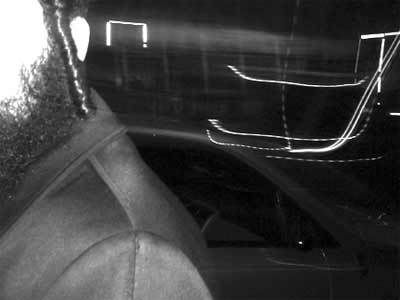
 Bagelblogger - Always Fresh!
Bagelblogger - Always Fresh!
 Move your mouse over to display Bagel menu.
Move your mouse over to display Bagel menu.












































 Haveil Havalim
Haveil Havalim














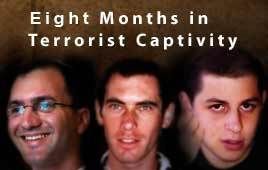 10 March 2007
10 March 2007 Gilad Shalit (20) was born on August 28, 1986. He is the son of Aviva and Noam Shalit and the brother of Yoel (23) and Hadas (16).
Gilad Shalit (20) was born on August 28, 1986. He is the son of Aviva and Noam Shalit and the brother of Yoel (23) and Hadas (16).
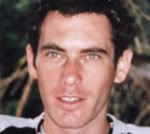









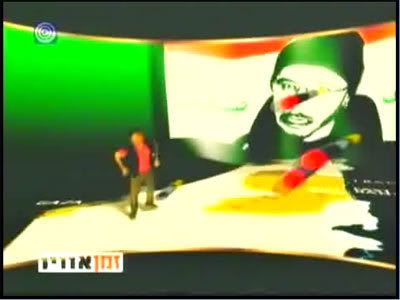

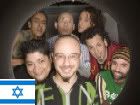 Tea Pack's song warns about the dangers of nuclear war, and the lyrics of the song refer to demonic and crazy rulers, and say that he's gonna blow us up to ... kingdom come.
Tea Pack's song warns about the dangers of nuclear war, and the lyrics of the song refer to demonic and crazy rulers, and say that he's gonna blow us up to ... kingdom come.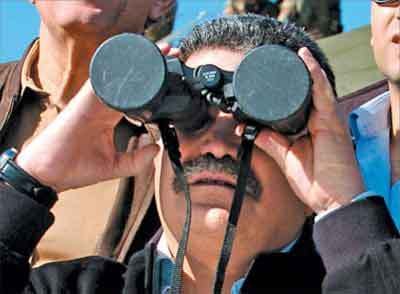
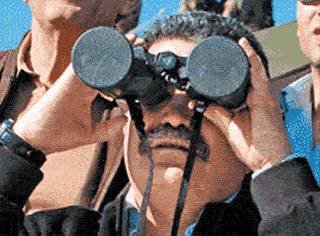






























 Make a Donation thru Paypal
Make a Donation thru Paypal


















